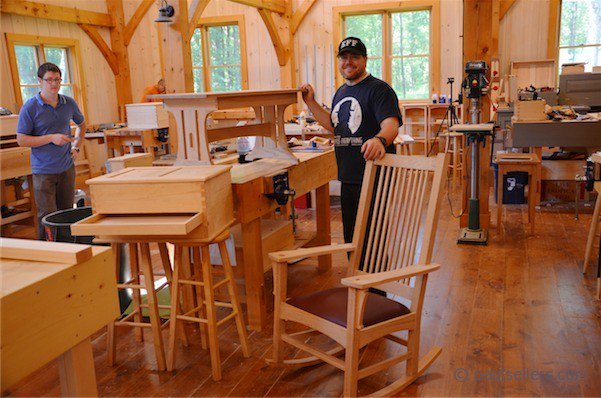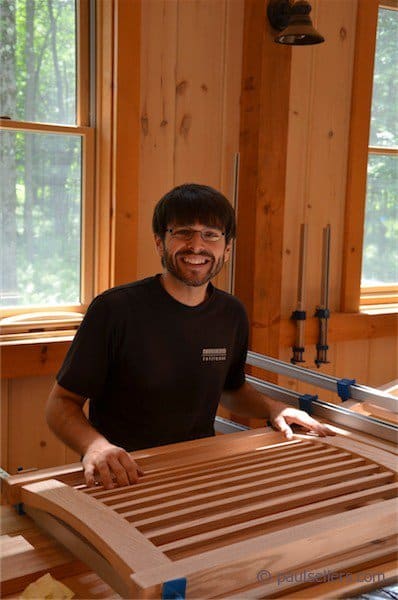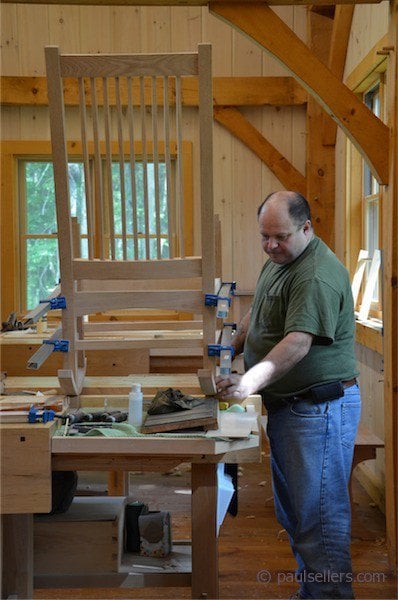Woodworking is my lived life
I personally think woodworking is a very marvellous thing and it doesn’t really matter whether you do it by hand or use machines or both. I like to do my work as much by hand as is practicable and so about ninety-eight percent of my work is indeed worked by my hands. I think this is the height of wonder to me. No one will ever change my thoughts on this because very few people I have met in the last 30 years or so have worked as much with either machines or hand tools as I have.
Anyway, it’s an unusual percentage in today’s world of course, and I know that. I think three times in the past week I have heard different perspectives on my argument that you can make a living working wood the way I do and that it’s exciting, interesting and creatively solved. There’s a basis for it I could go into but the main difference comes down to the same thing. To work wood well by hand you must develop skill in many areas, you must work efficiently, effectively and be creative throughout any and every given day. These abilities are developed, worked and rarely come without effort and determination. That’s actually all it takes.

Developing skill takes time, but not necessarily years, so that’s not usually the obstacle. What the obstacle I saw in my talking to the three people in the last week who told me you cannot make your living from woodworking these days was doubt. One was a woodworking teacher, the other was someone quoting another teacher and the third was someone who couldn’t make a living as a woodworker and became a teacher but then retired early from that. Not the best team to learn from. Three woodworking editors who were not woodworkers said the same thing some years back too.
It was never an option for me not to be a furniture maker and it is no less the same today. It does take determination though. I keep making, drawing and designing and then writing and making new films that pass on the skills I and knowledge that empowers others to learn, change lifestyle, build futures and keep my craft safe.
Most days in the course this week I listen and watch and try to guide. Hand seem more skilled to me. Work has improved but then minds have changed and so too most opinions. We have challenged doubt with lived reality and the guys are making things they never made before and at least four out of the ten never knew that they could make what they made until now. Isn’t that alone an amazing thing?
Now my work isn’t teaching but passing it on to others. We build and we plan and we reach out to woodworkers worldwide. I don’t know if I could ever be a happier man than I am now. Thanks to you all, every one of you.





Two days ago I wanted to do something, anything, at the bench. I had scavenged one cabriole leg (from a neighbor’s dismantled sewing machine table/cabinet) wondering if it could be shaped into a handle for a mallet. Well, cabriole legs curve this way and then that way, but clearly one curve had to go first.
I rip sawed it by hand. The offcut was 7-8 inches long, and 5/8 inches at the thickest in the middle; the ends tapering to slivers. When I held the cut to a straightedge and put it up to the window, I couldn’t see any light. I never did anything remotely like that before!
This, after more than 40+ years in office work, and only slapdash fix-ups around the house when they were absolutely needed. There is a circular saw, jig saw and miter/chop saw in the basement, and they wouldn’t have done that cut — that I just did with a handsaw.
OK, Paul, you’ve done well, whether teaching or passing it along. This old dog just learned a new trick.
I can’t remember who the quote is from, doubtless some great wit: “There are those who can, and do, and those who can’t and must resort to teaching.”
Well that great wit got it very wrong this Time ….Paul is an enviously superb tradesman with a natural ability to be an excellent teacher
I found that the best teachers are those who succeeded greatly in their subject and then felt compelled to pass on to others what they themselves have mastered and learned.
There are also those who thinking teaching is easy. I’ve seen young people, just degreed at some college, seek teaching jobs as a refuge from the job market. They either learn better, or just don’t make it.
“These abilities are developed, worked and rarely come without effort and determination.”
You summed up exactly what it takes to excel at anything. I have tried to explain to a lot of people that anyone can do anything they put their mind too. Sometimes you might have to work a little harder than the other person. But you can do it. But now a days, it seems most people do not want to put forth the effort. I find it really sad that people limit themselves so much.
The reason I traveled to Wales and took your class was that you seemed to really care about people and wanted them to do their best. Plus you loved what you taught and wanted to pass it one. There is something special in that.
On the note about making money at woodworking. You can do it. I grew up in the largest Amish population. There where many there that worked with wood and made a living. Some used machines and others not so much.
Like anything for a living, there is a business side to a ww’ing shop and as a business owner (not ww’ing) I know this is the area where failure stems from. Not having a viable business plan, sufficient financing, the right demographics, knowing what sells and how to sell it – these are just a few areas of trouble for ANY business venture.
Specific to ww’ing, the biggest obstacle to me is that overall the general public values craftsmanship but is unwilling to pay for it. Plus there is only a very small section of society that can even recognize fine furniture when they see it.
Since the industrial revolution and mass production have squelched the craftsman trades and now global marketing has become the norm, how is the small entrepeneurial-minded craftsman to ply his trade sufficient to actually live off of it?
This is why so many of the really successful ww’ers actually make their bread and butter from teaching, not building reproduction furniture.
Not saying it can’t be done, just saying you have to have the clientele willing to pay up to 10X as much as the furniture store sells for.
I have to agree with you, Robert. The lone practitioner’s day is pretty much over. Instead of rehashing what you said, I’d agree it’s spot on. After over ten years of trying on my own, I had to go and get a salaried job.
Yet, for instance, individual photographers can not only thrive, but their small commercial shops can support employment and career ladders (call that apprenticeships) for younger people willing to work for scratch money. The same for small publishers (print or electronic). and so on. There are niche markets willing to pay the cost in all these fields. They want excellence and exclusivity. They are very hard to find. And it’s a hard sell.
If I had worked with my hands instead of with a computer, sitting on my duff and on a salary, when I was finally no longer able to work, I would not have had the safety net of a dying institution called retirement. And here I am. This is why, perhaps, Paul has cited amateurs as a mainstay of fine woodwork. (Not saying I achieve “fine”, but I aspire.)
The utterly great photographer, Ansel Adams, wrote books and taught to supplement his solitary pursuit of perfection in American western landscape photography. Little known is the fact that he had a steady but meager income by making high school yearbook photographs. His art photography did not fully support him until about age 70.
Paul, if you’re reading this, don’t I recall that you wrote that you have sold thousands of wooden spoons? How many sold to earn a pound? Bushcrafters, bless their busy hearts, can’t really say spoons are much of a living. but they help. Of course, the entrepreneurial Bushcrafter teaches, typically online.
Oh, I don’t know, there are so many ways to measure success I think. Before I began teaching, and I have cut back to 8 weeks a year now, I raised a family of five on a single income wage for around 35 years. Even when I started my first woodworking schools I only taught Saturdays for the first few years and continued as a maker designer working the other five days to provide. In the evenings I held classes for dozens of kids for free four nights a week. More successes in each little face. I don’t remember in my fifty years of woodworking ever having a single day when I didn’t have a full day’s work. Was that luck? I don’t think so at all. I just felt that it was worth the effort and did it with all my heart.
The need for a decent school came up when the institutions took over training and presented their flawed perspective under government and educational/economic/political rule. I started my woodworking business as a self-employed woodworker one day when I decided I wanted to start a business. I put an advert in the paper and the first phone call came in and gave me work. Was it easy? No, not always, it just took some extra effort beyond the ease of working for someone else. I had to work longer hours for less money than everyone else did most of the time. I had no private pension plan and not much if anything in savings, but that was mostly because of my decision and my choosing.
It’s a good idea to have a business plan but not to prove to a bank you can borrow from them and pay them back but to evaluate whether you have what it takes and can think outside job security, pension plans and benefits. The best plan is not to borrow at all. Don’t borrow at all and especially from family and friends either. It’s good to have a plan B which for me is be prepared to adjust. I have started several businesses woodworking and they all worked in providing for my family. Did I get rich? I did. I was rich in my life by my family. I ate three meals a day at the same table with them. They came in the shop after school and made everything from coracles to cellos, guitars and violins, wooden spoons and even two pieces for the White House Permanent Collection alongside me. This was my richness. Money in the bank? Not really, never wanted it, but enough for my needs and the needs of others. Borrowing money? No, I avoided borrowing. I found it important for my wellbeing to be debt free and not borrow.
I’m not sure if the “really successful woodworkers earn their bread and butter from teaching” or whether they couldn’t make it from woodworking and therefore became teachers. I’ve met many of these. On the other hand I do know some really gifted woodworkers that feel a spirit of generosity and pass on their skills to others for that reason. I’ve met or known others that were reasonable woodworkers but were better administrators and some that were better managers than they were woodworkers. It takes all kinds. The worst kind were the ones I worked with when I was young. These are the mediocre teachers that lost their way and so became teachers in colleges and were responsible for young lives. If you got a good one though, and that happened occasionally, they could light a fire in a young heart and really inspire them. Anyway, this is my own experience.
Oh, I just thought, the three failed businesses were partnerships where expectations differed after the fact. Don’t so partnerships is my advice.
More then anything a great teacher needs passion for their subject. Paul has that.
Paul,
I have a couple of comments and questions.
Firstly, here in the US, 50% of business of all kinds fail in the first year. Likely because of poor planning, environment, and business sense/management. I suspect that many woodworkers fail for similar reasons despite being talented woodworkers.
Secondly, I was looking at the chart in your book and reflecting on the sheer number of skills, techniques, and tools it takes to become a master at your level (let alone experience) and was floored. My next thought was so many of those skill and techniques are advanced skills that one does not have to tackle or master in order to make beautiful woodworking. My mind them drifted to a comparison with your approach to teaching and the simplicity of those teachings like the “10 tools and the 3 joints” philosophy and many others. This caused me to remark to myself how entry-level hand tool woodworking doesn’t HAVE to be complex or overwhelming. Then I thought of my personal journey and transition from machines to hand tools and was astounded by just how quickly I acquired the requisite skills to become a competent artisan woodworker—not long at all and FAR less than one would expect. Weeks rather than years really! If only more aspiring woodworkers could understand it’s nowhere nearly as daunting as it seems, perhaps more young people would embark on our wonderfully fulfilling craft.
As for my question, what percentage of woodworkers do you think engage in mostly hand tool, artisan type, woodworking? I would define this as those like you and me who accomplish at least 80% of their work exclusively with hand tools. I can’t seem to find any info on this and was wondering what you and others might think. From my limited interactions with other craftsman it seems to be FAR LESS than 10%. I know my experience amounts to nothing more than anecdotal evidence especially since I don’t go to many woodworking gatherings, but I’ve only met one other woodworker who was cut from the same cloth
I know when I first arrived in the US in 1987 I was stunned by the impact machine woodworking had had on the craft. Not opposed to the widespread use of the machine, more surprised that hand tools were no longer evident hardly at all. It seemed to me that everyone I met had a machine shop better than anything I or most anyone I knew in the UK had ever had or indeed had that as their aspiration. Very few were interested in hand tools and saw that as a mostly primitive. Mostly they only seemed to talk about routers to me and asked which router or tablesaw I used. These people were not woodworkers making their living from it but enjoyed woodworking as a hobby for the main part. I cannot recall meeting a single woodworker for several years that owned any hand tools to actually use except as decorator items on shelves and peg board. I recall, as I always opened my workshop to the public, people coming in to see my workshop where I used 95% hand tools. At my workbench they were seeing a man working with hand tools for pretty much the first time outside of shop class in school where nothing really worked too well and expressing the wow factor. But after a few minutes they inevitably asked if they could see my tools. I recall bewilderment the first time this happened because they’d been there 20 minutes watching me make a sleigh bed or a conference table and then I understood. “Oh!” I’d say. “You mean my machines.” Power tools are what the rest of the world then called machines. Then 20 years later I returned to the UK and lo and behold isn’t the rest of the world calling them power tools too. Oh well. The main difference is how people laughed at me in the beginning with my primitive little gathering of hand tools and how different it is today when people all the more are discovering their absolute validity once they work to establish skill. It’s true, when all is said and done, machines are valid pieces of woodworking equipment for woodworkers and they have replaced the need of skill for much work and especially the donkey work. The rest of the world beyond North America on the other hand does not generally have a full machine shop for woodworking. In fact they have surprisingly few if any at all. Mostly it has to do with safety, space and noise and the fact that there was no Norm for two decades after the New Yankee Workshop was at its zenith. Of course life would be hard without any machines. In my castle workshop currently `i rely only on a bandsaw for occasional use in any given day but I also have a full compliment of machines in my garage for milling the stock for classes.
My current class has a surprisingly high percentage of young people in it. Probably the majority are under 40 with many under 30 and many that never did have the opportunity to do any kind of woodworking because of educationalists, economists and politics all of whom know little or nothing about craft and the art of work but all of whom have the primary influence over the future. They would no more listen to someone like me than fly to the moon but it makes no difference to my quest in helping people step off the conveyor belt and take a new initiative. The people I reach now know that skill is something to strive for and that learning to use a machine takes but a few hours understanding the safety implications to counter the high risk factor of using dangerous machines. They would never have come for a machine course to become a machinist because they are looking to become more skilled and so come because they want mastery and the skills of woodworking not merely the traditionalism or symbolism but the real thing.
Paul I have to smile when you use the term “machines” because I have on several occasions in other forums attempted to engage in a discussion on the over emphasis of power tools.
The question is where do you draw the line between a craftsman woodworker and what I call a “wood machinist”. All this talk of 1/1000’s of an inch and time spent dialing in a set up to make 2 cuts (when a few passes with a hand plane is well …..). I think it’s the influence of mass production combined with lack of patience and/or time.
I think for a lot of us hobbyists, we simply don’t have all day to work and maybe come to rely on machines more than we should. Now how do I know this? Hmmmm.
It only took me 25 years to realize sweeping up shavings and the sound of a hand plane is actually relaxing and I don’t feel like I’m working in an assembly plant.
“It only took me 25 years to realize sweeping up shavings and the sound of a hand plane is actually relaxing and I don’t feel like I’m working in an assembly plant.”
Well put.
Yes, one of my favourite things to do is clean up and put in order.
I do definitely agree with the idea of “fire in the belly” and I will accede to your premise that when you want something bad enough then a kind of “urgency toward success” can propel one toward just that – success.
Oh, but how do we define success. Well, coming from America, I don’t have to tell you its all about $$$. Listen to the guys on some forums talking who’s got the biggest machine, the largest shop, etc. etc.
But I do have to stand on the problem of the public not recognizing and/or appreciating and/or willing to pay for craftsmanship of ANY kind, not just woodworking. Yes, there are always the few that will pay for a custom made saddle, shoes, clothes or furniture, but where is the aspiring ww’er to find people like that?
I am a scientist in my training and my thinking and I am in the medical field and own my own clinic. But both of my sons are artists. One, an accomplished cellist currently pursuing a Master’s degree at a prominent university in the states. The other a quite capable artist and drummer!! So where did this come from that’s another blog.
My point is – and in this I guess I bow to Mr. Sellers philosophy – that I once asked my some how he could make a living as a cellist. Immediately I knew this was error and my heart was saddened by the fact that I rained on my son’s dreams. And what’s happened is he can make more money playing a wedding than his brother makes in a 25 hour work week!!
Back to ww’ing as a living, I guess the reality still remains that you have to have clients before you make anything and there is a lot involved in that – yes, including luck!!
There are thousands of furniture makers making a living in the US. Some work alone while others work for others- it is a industry that exists. Working as a solo “studio” maker is a tough road as you rely on yourself, patrons, and the vagaries of passing styles but it is possible.
What is not possible is training for half a year, putting out a shingle and expecting to make a middle class wage. This is the case for handtool users and power tool users alike.
Dues have to be paid and some amount of failure is part of the game.
The tools used are secondary- I agree that hand work requires more skill and that it can produce superior results, but there is no need to make a hard and fast rule on this, just use the best tools for the job and be mindful of the trade offs you are making.
I think the missing piece is this. Once woodworking fell into the realm of power tools and manufactured wood most people stopped having quality pieces around and forgot what they looked like. Even antiquers love things because of age and patina and not necessarily because of the skill shown in the making. It will take a while to turn that ship around. It is going to take a lot of “amateur” woodworkers selling little bits of high quality pieces all over the world for a long time to get quality and skill back into the public experience and consciousness. When people argue that they can’t make a living at something it is usually because they don’t want to take the time to build something up from scratch. We live in a now society. If people really want something they will make it happen. Determination will trump talent any day. People have started to turn back to handmaking because of the satisfaction that they feel. Humans were made to create. It’s what we do best. Somewhere along the way we allowed ourselves to be taught that working hard is demeaning. Not so. Not so! There is obviously a public hunger for the artisanal skills that Paul is sharing with us. There will be a hunger for what is made with those skills too. It will just take time and determination and the belief that every little piece we make and sell will bring us closer to being able to ” make it” and that it will build the base for others to follow too.
I think that may have been from George Bernard Shaw’s Man and Superman.) Bob: I’m so discouraged. My writing teacher told me my novel is hopeless. Jane: Don’t listen to her, Bob. Remember: those who can, do; those who can’t, teach.
“Those who can, do; those who can’t teach.” What stupidity! That statement implies that all teachers are failures. Teaching is a vocation unto itself that requires a set of skills that are unique to that field. There are good ones, bad ones, horrid ones and excellent ones just like in any other field or trade, including woodworking. There are a lot of people that are teachers that could easily be making more money working in the private sector that would supply them with pensions and security too. They do it because that is their calling, just like woodworking is for Paul. Paul is an excellent teacher. People say you can’t make a living doing hand wood working. What I got from Paul’s response to that is that you can, but not necessarily if you base that on society’s standards. You have to focus more on living life as you want it to be. Not focusing on the money alone and hoping that will be enough to buy the life you want. That takes bravery and faith. Rare commodities, not just today, it has always been that way.
There is also nothing wrong with supplementing your income with something else while you build your skills. Even if you never get to the point of being a “full time” woodworker that doesn’t mean you failed if you and the people around you are happy. Just so you know, I am not a teacher but I have people in my life that are and I see the phenomenal amount of work and dedication it takes to be a good one. That quote really irritates me!
My daughter loves the big long shavings from my hand plane. I unravel them and show them next to the piece of wood they came from. She also has great fun with a small wooden plane producing her own from a piece of wood.
When kids come in the workshop I write their name on the edge of a board and plane it off. Then I give them the piece of shaving and show them their name curled up inside.
I like that. Will have to do it for my nephews.
Great idea. Hopefully my planing skills are up to it 🙂
That is a great idea, I have ( 2 ) Grandkids 4 & 8 one is a boy and the other is a girl and both love to hang out in my shop and make “sawdust” . I have put a side a few tools for them and they have a ball when they come over.
Thanks again Paul for what you share and do !
Steve
I feel sorry for the man that feels the need to climb a mountain to receive joy, just as I do for the puritan woodworker who rejects efficiency and pragmatism for the sake of their pride and their emotional investment in acquiring outdated skills.
A regular Stanley hand plane and a 24″ planer with a helix head and a digital readout that keeps dimensions to a thousandth are both machines that remove thin shavings off of wood. One simply has countless of many more hours of human ingenuity put into their continuing development. I personally appreciate being a beneficiary and a practitioner of that investment, because I can produce unequivocally superior and consistent results at 100 times the speed of the puritan with his hand plane.
I love making things, but falling in love with the tools or techniques that I use to make them only serves to stunt my growth. No reason to put such limits in place.
You haven’t grown in any way though. The machine does your work for you. Now the man who made the machines that made the machines that made the machines, he is the craftsman. You just push buttons and shove wood. There is the greater sadness in my view I think. I love my machine shop, but I mastered the tools that give me the greater joy. Oh, and “outdated skills”? Now that sounds like a puritan machinist if ever I heard it. Enjoyed it!
Sometimes I have fun. Sometimes I feel pride. Other times a quiet satisfaction. I never did get a Shelby 427 AC Cobra sports car and just as well. I’ve had fun, pride and quiet satisfaction much more directly and much more lasting. I walked the steep paths of Cinque Terre in Liguria, Italy, overcoming fear of heights, doubt about stamina, and look back on it with contentment knowing that no one did it for me. I remember the little steps and may the heavens grant me the opportunity to do it again. Because I know I can.
Regards,